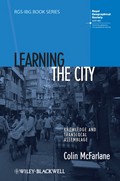Learning the City
Knowledge and Translocal Assemblage
RGS-IBG Book Series

1. Auflage August 2011
232 Seiten, Hardcover
Wiley & Sons Ltd
Learning the City: Translocal Assemblage and Urban Politics
critically examines the relationship between knowledge, learning,
and urban politics, arguing both for the centrality of learning for
political strategies and developing a progressive international
urbanism.
* Presents a distinct approach to conceptualising the city
through the lens of urban learning
* Integrates fieldwork conducted in Mumbai's informal settlements
with debates on urban policy, political economy, and
development
* Considers how knowledge and learning are conceived and created
in cities
* Addresses the way knowledge travels and opportunities for
learning about urbanism between North and South
Acknowledgements x
Introduction 1
1 Learning Assemblages 15
Introduction 15
Translation: Distribution, Practice and Comparison 17
Coordinating Learning 19
Dwelling and Perception 21
Assemblage Space 23
Conclusion 30
2 Assembling the Everyday: Incremental Urbanism and Tactical
Learning 32
Introduction 32
Incremental Urbanism 33
Learning the Unknown City: Street Children in Mumbai 43
Learning, Rhythm, Space 47
Tactical Learning 54
Conclusion 59
3 Learning Social Movements: Tactics, Urbanism and Politics
62
Introduction 62
Knowing Social Movements 63
Global Slumming 66
The Housing Assemblage: Materializing Learning 69
Learning and Representation: Counting the Poor 74
Entrepreneurial Learning 85
Conclusion 90
4 Urban Learning Forums 92
Introduction 92
Uncertain Forums 93
Dialogic Urban Forums 98
Translocalism and Translation 105
Conclusion 113
5 Travelling Policies, Ideological Assemblages 115
Introduction 115
Translating Policy 117
Comparative Learning: Translation and Colonial Urbanism 122
Ideology and Postwar Urban Planning 128
Neoliberal Urban Learning Assemblages 134
Ideology and Explanation: Beyond Diffusionist Story-Making
145
Conclusion 151
6 A Critical Geography of Urban Learning 153
Introduction 153
The Actual and the Possible 155
Agency and Critical Learning 160
Assemblage and the Critical Learning Imaginary 164
Postcolonial Urban Learning? 167
Conclusion 172
Conclusion 174
References 185
Index 205
our studies of knowledge and power through the optic of the
learning assemblage. Its revelatory power is arguably profound for
McFarlane, it promises nothing short of understanding the power to
forge a different kind of city." (Antipode, 1
September 2013)
"This book is a significant step in bringing learning to
the core of urban study... This volume's detailed
fieldwork effectively supports its desire to see learning occupy a
central place in the production of more socially just
urbanisms." (Area, 1 May 2013)
"Learning the Cityis a critical academic contribution
useful for scholars of the field. found it particularly
useful for my research on policy circulation of Bus Rapid Transit
concepts through the South African city . . . While Learning the
Cityis probably too sophisticated for younger readers, it is sure
to become indispensable for academics of the
discipline." (Geography Helvitica, 1 December
2012)
"Through Learning the City McFarlane has made a major
contribution to our understandings of the urban. In its commitment
to the diverse and lively practices through which the city is
learned and known, in its engagement with the diverse forms of
agency and political practices through which agency is assembled
and re-assembled the book enlivens understandings of spatial
politics. It is also a text that is animated by a powerful sense of
hope that cities might come to bere-assembled in different ways
that are more equitable and more open to different agentic forces
and contributions." (Society and Space, 1 November 2012)
"There will certainly be a range of contributors that join in on
the exciting task of making these links. In Learning the
City, McFarlane successfully manages to open the black box of
urban learning in widening the perspective to acknowledge diverse
urban learning practices, which may even bear a transformative
potential in certain contexts." (International Planning
Studies, 23 October 2012)
"Urbanism, McFarlane believes, needs a theory of learning;
throughout his book he builds a very sophisticated one...[he]
brings us closer to the material stuff of urban life and
politics...a kind of urbanism in motion, whereby what we come
to term 'knowledge', 'infrastructure' and
'resources' are never simply 'there', but
must be translated, distributed, coordinated, perceived and
inhabited". (International Journal of Urban and Regional
Research, Volume 38.1, January 2014).
"Innovative in its approach and rigorous in its coverage, this book
is an important contribution to the field of urban studies and
human geography. It challenges the standard format of the research
monograph and introduces new vectors of knowledge and debate to the
study of cities. In a world where the usual North-South dichotomies
are being disturbed, McFarlane's emphasis on a postcolonial
approach to practices of learning is a valuable framework."
--Ananya Roy, University of California
"McFarlane's work stands out in that it tells us how residents
from various walks of life actually learn to operate in
heterogeneous and often volatile urban environments. Instead
of assuming that urban dwellers walk around with preconceived maps
in their heads, this book provides a comprehensive account of the
various practices, mobilizations and tools they use over time so
that the city becomes a staging area for new capacities and
potentials."
--AbdouMaliq Simone, Goldsmith College, University of
London


